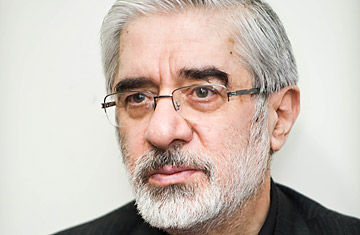
Iranian opposition leader Mir Hossein Mousavi photographed on Dec. 28, 2009 in Tehran.
There was a palpable sense of excitement among the supporters of Iran's opposition Green Movement in recent weeks. A mass rally was planned for Tuesday, the one-year anniversary of the house arrest of opposition leaders Mir Hussein Moussavi and Mehdi Karroubi, and a large turnout was expected. Flyers were posted on opposition websites and the Twitter-verse was abuzz with messages from Green supporters encouraging each other.
The Iranian regime squashed it. Even though Green supporters hit the streets in Tehran and smaller cities like Isfahan and Shiraz on Tuesday, they appeared to be outnumbered by security forces, according to accounts on opposition websites. There were also reports of arrests and sporadic clashes between riot police and demonstrators on some opposition sites. Still, the presence of demonstrators in the streets of large Iranian cities for the first time in a year shows that the Green Movement hasn't been completely snuffed out. "You can't gauge the amount of support for the opposition by the number of people in the streets. The strong crackdown by the government keeps many people away," says Hossein Bastani, an Iran analyst based in Paris. "But when there's any people at all in the streets, it still rattles the regime."
In two weeks, Iran's leaders will ask voters to hit the polls for a key vote for the majlis or parliament. This will be the first election held in the country since the contested presidential election of Mahmoud Ahmadinejad in 2009, which kicked off months of violent protests. The regime was clearly concerned that Tuesday's protests could set the stage for another round of election violence and that's why they came out in force. Supreme Leader Ayatullah Ali Khamenei raised concerns about the possibility of election unrest in a Friday prayers speech two weeks ago. "The busier the ballot box and the higher the rate of participation, the greater the prestige and strength of the country," Khamenei said. And he warned of the potential pitfalls ahead. "The enemy doesn't want this. It's been two or three months that the enemy has spread propaganda to discourage people from participating in the elections. And some inside the country, without knowing what they're doing, are saying the same things. This is a careless and mercenary attitude."
Last year on Feb. 14, opposition leaders Moussavi and Karroubi called for the "25th of Bahman" protests, named after the date in the Iranian calendar, to show solidarity with the Arab Spring uprisings in the region. One of the popular slogans used by demonstrators last year was "Mubarak, Ben Ali, now it's time for Seyed Ali," a reference to Supreme Leader Khamenei. There was a massive turnout in Tehran and other cities and two protesters were killed, according to opposition sources.
This year, the regime was well prepared. For more than a week, there has been a blackout on social networking sites like Facebook and Twitter. Even Gmail and Yahoo email were blocked. Internet speeds have almost ground to a halt. And then the intimidation campaign began: text messages and emails were sent out to students and activists threatening them with arrest if they participated in the planned demonstration on Tuesday. There was also a wave of arrests of activists in the lead-up to Tuesday's protest, according to opposition websites.
Green Movement supporters had called for demonstrators to rally in the streets of Tehran by 4 p.m. on Tuesday. Photos posted on opposition sites showed that security forces had already flooded the streets by that time. Text messaging services were also shut down. The protesters who did hit the streets in Tehran largely stayed away from controversial slogans this year, as had been advised in the demonstration flyers.
The irony is that the Iranian regime's crackdown on the "25th of Bahman" protest on Tuesday coincided with the one-year anniversary of the democratic uprising in Bahrain, a largely Shi'a-led protest movement that the Iranian government strongly supports.
"In Iran, if the security forces backed off for one day, only one day, you would see the real strength of the opposition," says Bastani. That's unlikely to happen anytime soon. In fact, the riot police are no doubt gearing up to hit the streets again for Iran's parliamentary elections on March 2.
